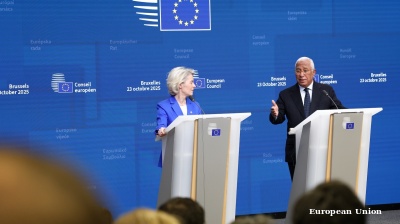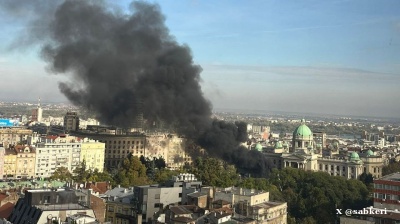Serbia's President Aleksandar Vucic expects the United States to clarify its position on potential sanctions against NIS, Serbia's Russian-owned oil company, by January 15, he announced on January 2.
NIS, a critical player in Serbia's energy sector, is 50% owned by Russia’s Gazprom Neft, 6.15% by Gazprom and nearly 30% by the Serbian government, with the rest held by smaller shareholders.
“We expect the sanctions paper on January 10 or 13,” Vucic said during a televised address. “There will be no shortages because we have sufficient reserves, and the issues will be dealt with promptly.”
While Washington has not confirmed sanctions targeting NIS, Vucic warned in December of potential measures as part of broader Western sanctions aimed at Russian entities over the ongoing war in Ukraine.
Vucic’s remarks followed a phone call with US Undersecretary for Economic Growth, Energy and the Environment Jose Fernandez, on January 2. The president said that “sanctions were a special topic” during their conversation.
When asked about the discussion, the US State Department declined to share details but reiterated its broader stance on sanctioning Russian entities tied to the Ukraine conflict.
Some opposition figures and critics in Serbia have raised doubts, accusing Vucic of using the prospect of sanctions to divert attention from domestic issues, amid weekly protests over a deadly accident at Novi Sad train station on November 1.
If the sanctions are real, however, they will place Serbia in a precarious position.
Gazprom’s additional 6.15% stake in NIS, purchased from Gazprom Neft in 2022, has further solidified Russian influence in the company, complicating Serbia’s efforts to navigate between its traditional ties with Moscow and aspirations for closer relations with Western powers.
The potential sanctions underscore the delicate balancing act Serbia faces as it seeks to maintain its strategic partnership with Russia while pursuing economic and political integration with the West.
As the January 15 deadline approaches, the Serbian government braces for the potential economic and political ramifications of the United States' decision.
“I’ve requested as much time as possible to adapt, but we’ll see how it unfolds,” Vucic told RTS, Serbia’s public broadcaster.
News

Trump would like to meet North Korea’s Kim Jong Un during Asia trip
The prospect of renewed diplomacy between Washington and Pyongyang has lingered since Kim’s remarks last month suggesting a willingness to speak to the outside world.

Bill Gates makes surprise Indian TV debut
In a move set to spark both intrigue and curiosity, Microsoft co-founder and philanthropist Bill Gates has made a cameo appearance on Indian television, entering the iconic drama series Kyunki Saas Bhi Kabhi Bahu Thi 2.

Queen Sirikit of Thailand dies
The death of Queen Sirikit of Thailand has marked the end of an era for the Thai monarchy. According to an official statement from the Bureau of the Royal Household of Thailand, Her Majesty died at 9.21 pm on October 24.

Pakistan, the latest in Asia to see gold prices plummet
In international trading, the precious metal lost $35 per ounce to settle around $4,115, extending a week-long slide triggered by shifting expectations over US monetary policy.
_1761305900.jpg)



